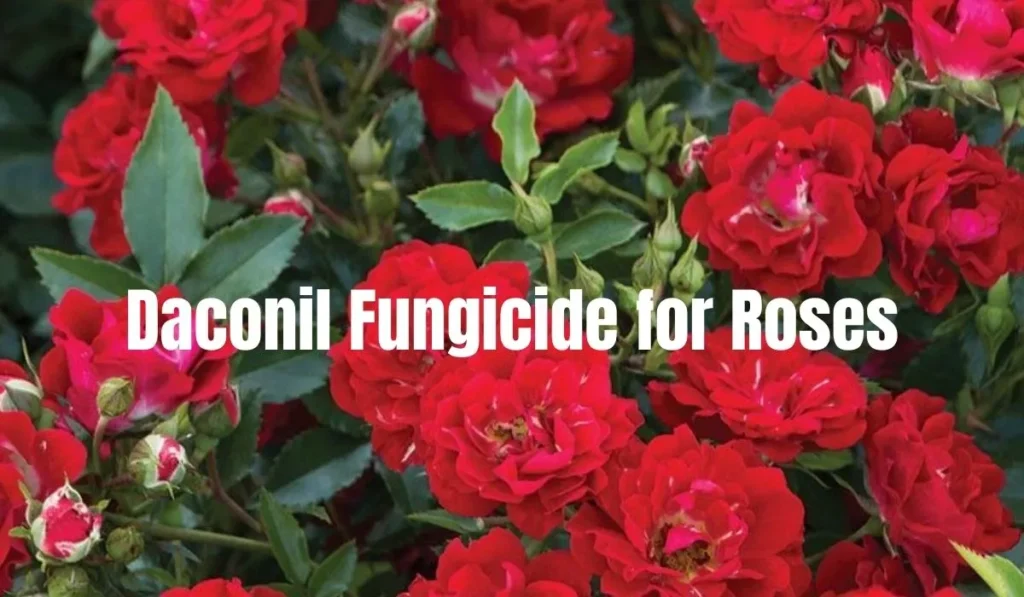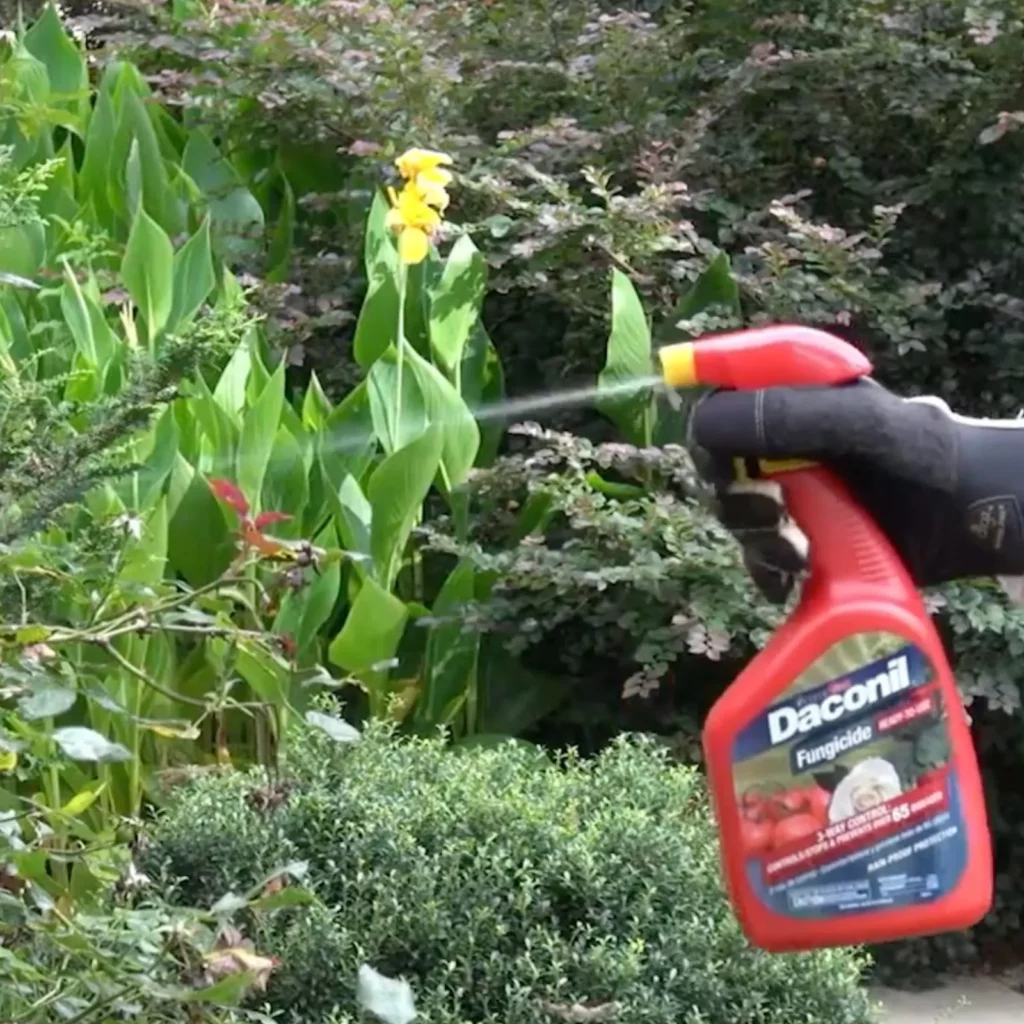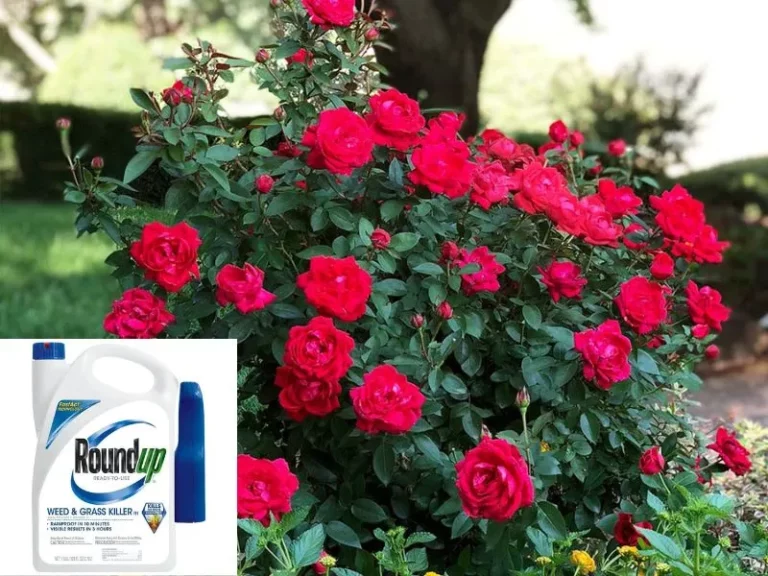Daconil Fungicide for Roses: Keeping Your Garden Healthy and Beautiful
Are black spots marring your roses? Black spot, a fast-spreading fungal disease, can devastate your garden. Fortunately, there’s a solution: Daconil fungicide for roses, which effectively controls over 65 diseases, including black spot.
Daconil fungicide is versatile, suitable for vegetables, fruits, flowers, shrubs, trees, and ornamentals. Protect your garden from fungal diseases and ensure plant health with Daconil.
In this article, we’ll discuss why Daconil fungicide excels in controlling rose fungal diseases, usage tips, timing, and its benefits.
Key Takeaways
- Daconil fungicide for roses can control and prevent over 65 different diseases, including black spot.
- Using Daconil fungicide is easy and effective and can be used on a variety of plants.
- By using Daconil fungicide, you can protect your garden from fungal diseases and keep your plants healthy and strong.

Daconil Fungicide for Roses
If you’re a rose lover, you know how frustrating it can be to deal with black spot and other fungal diseases that can ruin your beautiful blooms. Luckily, Daconil fungicide is here to save the day! This powerful fungicide can control and prevent over 65 diseases, including black spot, powdery mildew, and rust.
Using Daconil on your roses is easy. Simply mix the concentrate with water according to the instructions on the label, and spray it onto your plants. You can use Daconil on a wide variety of plants, including vegetables, fruits, flowers, shrubs, trees, and ornamentals.
Here are some tips for using Daconil on your roses:
- Apply the fungicide in the morning or evening, when temperatures are cooler and there is less chance of the spray evaporating.
- Make sure to spray the undersides of the leaves as well as the tops. Fungal spores can hide on the undersides of the leaves and cause reinfection.
- Repeat the application every 7-14 days, or as needed. Be sure to follow the instructions on the label for the specific plants you are treating.
Daconil is rain-proof, so you don’t have to worry about it washing off in the next rain shower. However, if you’re expecting heavy rain, it’s best to apply the fungicide a few days before to ensure maximum protection.
One thing to keep in mind is that Daconil is a preventative fungicide, not a curative one. This means that it’s best to use it before you see signs of disease on your plants. If you already have black spot or other fungal diseases on your roses, you may need to use a curative fungicide in addition to Daconil.
Overall, Daconil fungicide is a great tool to have in your arsenal if you’re a rose lover. It’s easy to use, effective, and can help prevent fungal diseases from ruining your beautiful blooms. Give it a try and see the difference it can make in your garden!
Why Use Daconil Fungicide for Roses?
If you’re a rose lover, you know how frustrating it can be to see your beautiful flowers succumb to fungal diseases like black spot, rust, and powdery mildew. These diseases can quickly spread and cause significant damage to your roses, leaving them weakened and vulnerable to other pests and diseases.
That’s where Daconil fungicide comes in. This powerful fungicide is specially formulated to control and prevent over 65 different fungal diseases, including those that commonly affect roses. Here are just a few reasons why Daconil is a must-have for any rose grower:
- Effective control: Daconil is a broad-spectrum fungicide that works quickly to control existing fungal infections and prevent new ones from taking hold. Its active ingredient, chlorothalonil, attacks the fungus on multiple fronts, making it highly effective against a wide range of diseases.
- Easy to use: Whether you choose the ready-to-use spray or the concentrate, Daconil is easy to apply and provides long-lasting protection. Simply spray the product onto your roses according to the label instructions, and you’re done!
- Versatile: In addition to roses, Daconil can be used on a wide range of other plants, including vegetables, fruits, flowers, shrubs, trees, and ornamentals. This makes it a great all-purpose fungicide to have on hand in your garden shed.
- Affordable: Compared to other fungicides on the market, Daconil is an affordable option that provides excellent value for your money. Plus, because it’s so effective, you’ll need to use less of it over time, which can save you even more.
Overall, Daconil fungicide is a must-have for any rose grower who wants to keep their plants healthy and disease-free. With its powerful control, ease of use, versatility, and affordability, it’s no wonder that so many gardeners swear by this product. Give it a try and see the results for yourself!
How to Use Daconil Fungicide for Roses

If you have black spot on your roses, don’t worry! Daconil fungicide is here to save the day. With over 65 diseases controlled and prevented, this product is a must-have for any rose enthusiast. In this section, we’ll go over how to safely and effectively use Daconil fungicide on your roses.
Safety Precautions
Before using Daconil fungicide, it’s important to take some safety precautions:
- Wear protective clothing, including gloves, long sleeves, pants, and closed-toe shoes.
- Keep children and pets away from the treated area until the product has dried.
- Avoid spraying on windy days to prevent drift onto other plants or surfaces.
- Do not apply to plants that are stressed or wilted.
Application Process
Now that you’ve taken the necessary safety precautions, it’s time to apply Daconil fungicide to your roses. Here’s how:
- Identify the disease: Before applying Daconil fungicide, make sure you have correctly identified the disease affecting your roses. Daconil is effective against black spot, leaf spot, rust, and other fungal diseases.
- Mix the fungicide: Follow the instructions on the label to mix the Daconil fungicide concentrate with water. The amount of concentrate needed will depend on the size of your garden and the severity of the disease.
- Apply the fungicide: Spray the fungicide on the leaves, stems, and flowers of your roses, making sure to cover all surfaces evenly. Be sure to apply the fungicide when the weather is dry and calm to prevent drift.
- Repeat as necessary: Depending on the severity of the disease, you may need to repeat the application every 7-14 days. Be sure to follow the label instructions for re-application and maximum yearly total application rates.
- Clean up: After using Daconil fungicide, clean your equipment thoroughly with soap and water. Store the product in a cool, dry place away from children and pets.
Using Daconil fungicide on your roses is an effective way to control and prevent fungal diseases. By following these safety precautions and application instructions, you can keep your roses healthy and beautiful all season long.
When to Use Daconil Fungicide for Roses
If you want to keep your roses healthy and beautiful, you need to use Daconil fungicide. But when should you use it? In this section, we’ll discuss the ideal seasons and the signs of fungal infection that indicate you should use Daconil.
Ideal Seasons
The ideal seasons to use Daconil fungicide on your roses are spring and fall. In spring, apply the fungicide after the first flush of growth appears. This will help protect your roses from fungal infections that can occur during the wet spring weather.
In fall, apply the fungicide after the first frost but before the ground freezes. This will help protect your roses from fungal infections that can occur during the winter.
Signs of Fungal Infection
It’s important to know the signs of fungal infection in your roses so that you can apply Daconil fungicide at the right time. Here are some signs to look out for:
- Black spots on the leaves
- Yellowing or browning of the leaves
- Wilting or drooping of the stems
- White powdery coating on the leaves
If you notice any of these signs, it’s time to apply Daconil fungicide to your roses.
Remember, prevention is better than cure. So, it’s best to apply Daconil fungicide as a preventive measure in the ideal seasons mentioned above rather than waiting for signs of fungal infection to appear.
Benefits of Daconil Fungicide for Roses
If you’re a rose lover, you know how frustrating it can be to watch your beautiful blooms succumb to fungal diseases like black spot, powdery mildew, and rust. Luckily, Daconil fungicide is here to help!
Daconil is a powerful fungicide that can prevent and cure a wide variety of fungal diseases on your roses. Here are some of the benefits of using Daconil for your roses:
Preventive Benefits
One of the best things about Daconil is that it can be used preventatively to keep your roses healthy and disease-free. By applying Daconil regularly, you can create a protective barrier that prevents fungal spores from taking hold on your roses.
This can be especially helpful if you live in a humid or rainy area where fungal diseases are more common. Some of the preventive benefits of Daconil include:
- Controls and prevents over 75 plant diseases, including black spot, powdery mildew, and rust.
- Starts controlling diseases on contact, so you can stop the spread of disease before it gets out of control.
- Rain-proof formula for spot application, so you don’t have to worry about reapplying after every rain shower.
- Can be used on a wide variety of plants, including vegetables, fruits, flowers, shrubs, trees, and ornamentals.
Curative Benefits
If your roses are already infected with a fungal disease, don’t worry – Daconil can help with that too! Daconil is a curative fungicide, which means it can help cure existing fungal infections on your roses. Some of the curative benefits of Daconil include:
- Controls and prevents over 65 plant diseases, including black spot, powdery mildew, and rust.
- Starts controlling diseases on contact, so you can stop the spread of disease before it gets out of control.
- Rain-proof formula for spot application, so you don’t have to worry about reapplying after every rain shower.
- Can be used on a wide variety of plants, including vegetables, fruits, flowers, shrubs, trees, and ornamentals.
In addition to its preventive and curative benefits, Daconil is also easy to use and safe for your plants when used according to the label instructions. So if you’re looking for a powerful fungicide to protect your roses from fungal diseases, give Daconil a try!
Frequently Asked Questions (FAQs)
Can Daconil Fungicide be Used on Roses?
Yes! Daconil fungicide is an effective treatment for roses infected with black spot, rust, and other fungal diseases. It can be used on all types of roses, including hybrid tea roses, floribunda roses, and climbing roses.
What is the Best Fungicide for Black Spot on Roses?
Daconil fungicide is one of the best fungicides for black spot on roses. It is a broad-spectrum fungicide that controls and prevents over 65 diseases, including black spot, rust, and powdery mildew. Other effective fungicides for black spot on roses include Bonide Fung-onil Multi-Purpose Fungicide and Bayer Advanced Disease Control for Roses, Flowers & Shrubs.
How Do I Apply Daconil Fungicide to My Roses?
To apply Daconil fungicide to your roses, mix the recommended amount of concentrate with water and apply using a garden sprayer or watering can. Be sure to cover all surfaces of the plant, including the leaves, stems, and flowers. Apply every 7-10 days or as needed, depending on the severity of the disease.
What are the Uses of Daconil Fungicide?
Daconil fungicide is a versatile fungicide that can be used on a variety of plants, including roses, vegetables, fruits, and ornamentals. It is effective in controlling and preventing fungal diseases such as black spot, rust, powdery mildew, and anthracnose.
How Often Should I Apply Daconil Fungicide on My Roses?
The frequency of application of Daconil fungicide on roses depends on the severity of the disease and the weather conditions. It is recommended to apply every 7-10 days or as needed. During periods of heavy rainfall or high humidity, more frequent applications may be necessary.
Is Daconil Fungicide Effective for Preventing Rose Diseases?
Yes, Daconil fungicide is effective for preventing rose diseases. It not only controls existing fungal infections but also prevents new infections from occurring. Regular use of Daconil fungicide can help keep your roses healthy and disease-free.
Conclusion
In conclusion, Daconil fungicide is an effective solution to combat black spot and other fungal diseases that can plague your roses. By using Daconil, you can prevent and control over 65 diseases that can harm your plants. Here are some key takeaways:
- Daconil is specially formulated to defend your rose plants against diseases like botrytis, rusts, and other fungal infections.
- Daconil is easy to apply and can be used with a hose-end garden sprayer or other common garden tools.
- Daconil can be used on a variety of plants, not just roses.
When using Daconil, it is important to follow the instructions carefully and apply it at the right time to get the best results. Remember to wear protective clothing and avoid spraying on windy days to prevent the product from drifting onto other plants or surfaces.
Additionally, it is important to note that Daconil is not a cure-all solution and should be used in conjunction with good gardening practices. This includes regular pruning, proper watering, and removing any infected plant material.
Overall, if you want to keep your roses healthy and disease-free, Daconil is a great tool to have in your gardening arsenal. By using it as directed and following good gardening practices, you can enjoy beautiful, healthy roses year after year.






